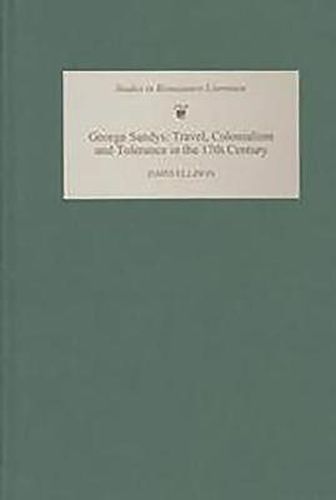Readings Newsletter
Become a Readings Member to make your shopping experience even easier.
Sign in or sign up for free!
You’re not far away from qualifying for FREE standard shipping within Australia
You’ve qualified for FREE standard shipping within Australia
The cart is loading…






The poet George Sandys is one of the most interesting figures of the Renaissance period, his life and career encompassing a number of varied aspects. As a colonialist leader in Virginia he and his colleagues pursued a lenient policy towards the Indians which nearly cost the colony its existence. Returning to England, and settling at Great Tew along with other poets such as William Chillingworth and Lord Falkland, he won limited favour at the Caroline court; although he was loyal to the king, and adopted a richly Laudian style for his religious verse, he was implacably opposed to the divisive and confrontational policies of the Laudian church, and became an increasingly outspoken critic of absolutist government. His last work, a translation of a Latin religious play by Hugo Grotius, was the first in a series of literary attacks by moderate Royalists on Archbishop Laud. This book, the first recent examination of his life and work, sheds new light both on an unjustly neglected figure, and on the literature of religious and political moderation prior to the Civil War. JAMES ELLISON is Honorary Research Fellow at the University of Strathclyde.
$9.00 standard shipping within Australia
FREE standard shipping within Australia for orders over $100.00
Express & International shipping calculated at checkout
The poet George Sandys is one of the most interesting figures of the Renaissance period, his life and career encompassing a number of varied aspects. As a colonialist leader in Virginia he and his colleagues pursued a lenient policy towards the Indians which nearly cost the colony its existence. Returning to England, and settling at Great Tew along with other poets such as William Chillingworth and Lord Falkland, he won limited favour at the Caroline court; although he was loyal to the king, and adopted a richly Laudian style for his religious verse, he was implacably opposed to the divisive and confrontational policies of the Laudian church, and became an increasingly outspoken critic of absolutist government. His last work, a translation of a Latin religious play by Hugo Grotius, was the first in a series of literary attacks by moderate Royalists on Archbishop Laud. This book, the first recent examination of his life and work, sheds new light both on an unjustly neglected figure, and on the literature of religious and political moderation prior to the Civil War. JAMES ELLISON is Honorary Research Fellow at the University of Strathclyde.